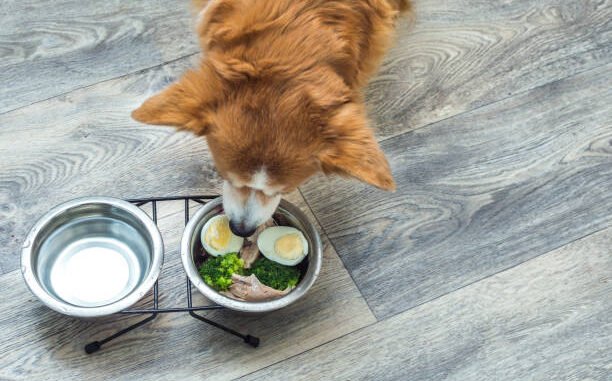
The short answer is yes. Whether boiled or cooked, eggs can make healthy treats or dietary supplements for your dog if given correctly.
Even though dogs are allowed to eat eggs, this doesn’t mean every feeding method is proper. It would help if you were sure that you are not seasoning the whey you want to feed your dog with ingredients like salt, onions, or other seasonings that contain omelettes. You will also want to be sure you are not adding oil, butter, or pepper while making eggs for your dogs, as these can harm our dogs.
I know you might now be considering ways to feed your dog’s egg since you are not allowed to include ingredients like sails, oils, onions, butter, or pepper. Worry less; we will guide you in feeding your dog’s egg without causing health issues.
Benefits of Eggs for Dogs
The common benefit of eggs in humans is their source of protein, the same as dogs. Eggs are protein-packed and rich in essential amino and fatty acids, vitamins, folate, iron, and selenium, providing various canine health benefits. Eggs are foods you shouldn’t include in your dog’s diet, ranging from improved skin and coat health to stronger teeth and bones.
However, while eggs can be so nourishing and safely be incorporated into your dog’s diet, it doesn’t mean they should become your dog’s primary source of nutrition.
Eggs, like chicken and rice, can also help with digestive issues and relieve stomach upset. It’s important to consult your veterinarian to determine how much eggs your dog can safely consume.
Tip
Experts generally agree that eggs can be included in a balanced diet when consumed in moderation and fed a few times a week as a supplement to high-quality food.
How to Feed Your Dog Eggs
It was once common for canines to raid birds’ nests and consume their eggs, consuming the raw eggs, including the shells. However, this mode of feeding your fig egg is not advisable. Consuming raw or undercooked eggs poses inherent risks for dogs, much like it does for humans. While the likelihood of experiencing side effects from raw eggs is relatively rare, cooking your dog’s eggs, preferably boiling them before including them in your dog’s diet, is strongly recommended. You can mash the egg and shell and feed your dog.
Before you start feeding your pet eggs, it’s important to talk to your vet first. Overfeeding eggs can lead to serious health issues such as obesity and Salmonella. While eggs are nutritious, they are also high in fat, so if your dog is overweight, it’s best to avoid giving it eggs for the time being or offer them in moderation.
While some bacteria from raw food can benefit your pet, properly storing your eggs will help ensure that any harmful bacteria are kept at a safe level. You’ll also want to shop for organic, free-range eggs whenever possible.
Dangers of Eggs for Dogs
Both canines and humans risk contracting diseases such as Salmonella from consuming raw eggs. This foodborne illness can be transmitted through raw eggs, raw meat, and contaminated dairy products. In pets, Salmonella may manifest with symptoms like;
- Vomiting
- Fever
- Bloody diarrhoea
- Loss of appetite
- Decreased activity level
Note: If your dog has preexisting health conditions like cancer or infections, you should avoid adding raw eggs to its diet due to its compromised immune system, which may not be able to handle the potential risk of contamination.
Feeding raw egg whites to your pet for a long time can lead to a deficiency in biotin. This is caused by an enzyme in egg whites that stops the body from absorbing biotin. Biotin is a B complex vitamin that supports healthy skin, metabolism, digestion, and cells in dogs and humans. Since egg whites contain enzyme inhibitors that can affect digestion, especially in puppies and seniors, giving eggs to your dog in moderation is important. While it would likely take a lot of eggs to cause a biotin deficiency in your dog, veterinarians still advise against feeding too many eggs.
Leave a Reply